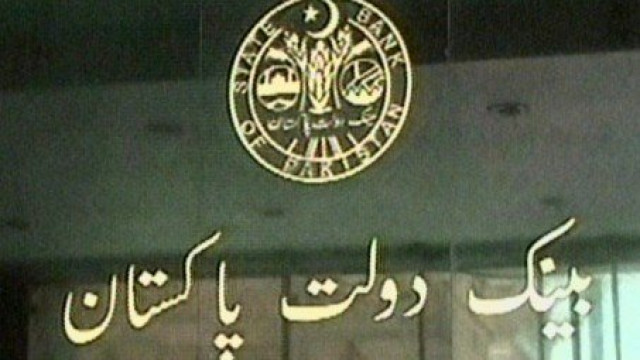SBP hikes policy rate by 100bps to record high of 21%
SBP views latest rate hike 'adequate to anchor inflation expectations'

Pakistan's central bank has hiked its benchmark policy rate by 100 basis points to new record high at 21% on Tuesday, saying the action was a must to anchor the elevated inflation reading.
The historical high policy rate coupled with several other fiscal measures like energy price-hike has, however, continued to slow down economic growth which is now estimated to "be significantly lower than the post-floods assessment of November 2022 (in FY23)."
Earlier, the central bank had estimated economic growth blow 2% for the current fiscal year 2023, it was learnt.
The increase in the policy rate was well in line with the market expectation for 100-200 basis points surge.
State Bank of Pakistan (SBP) said on its official Twitter handle "MPC (monetary policy committee) views today’s decision, along with the cumulative monetary tightening so far, as adequate to anchor inflation expectations around its medium-term target – barring any unanticipated shock."
Inflation reading hit six-decade high at 35.4% in March 2023. It is projected to peak out in range of 37% to 40% in April or May 2023, experts said.
The average inflation reading stands at 27.3% during Jul-Mar FY23. The central bank noted that "the surge in inflation was broad-based, though a large part of it was contributed by food and energy components. This reflects the pass-through of increases in taxes and duties, unwinding of untargeted energy subsidies and the recent exchange rate depreciation."
"Importantly, core inflation has risen to 18.6% in urban and 23.1% in rural baskets, indicating the second-round impacts of the above-mentioned adjustments."
On the other hand, experts viewed the central bank has increased the rate on the IMF recommendation to resume its $6.5 billion loan progrmme. Otherwise, the exercise of rate-hike has already become irrelevant in relation to control the elevated inflation, as demand for bank credit has already dried up from businesses in the private sector.
The central bank "reemphasized that the early conclusion of the 9th review under the IMF programme is critical to rebuild the FX (foreign exchange) reserve buffers."
The central bank also noted in its monetary policy statement that despite sharp reduction in current account deficit in recent months, external account vulnerabilities persist, "amidst low foreign exchange reserves, ongoing debt repayments and recent tightening in global financial conditions."
The reserves have depleted to $4.24 billion at present. On the contrary, Pakistan is to repay foreign debt worth $4.5 billion in three months (Apr-Jun 2023). The central bank, however, hopped the government would get half of the loans rolled over and it has to pay only $2.2 billion in actual in the three months.
SBP noted that since the last MPC meeting held in March, three important developments having implications for the macroeconomic outlook. First, the current account deficit has narrowed considerably, more than previously anticipated, mainly on the back of sizable import containment. "Nonetheless, the overall balance of payments position continues to remain under stress, with foreign exchange reserves still at low levels."
SBP Governor Jameel Ahmed, however, projected at analysts briefing on the latest monetary policy statement that the current account deficit (CAD) would sum at $6 billion in FY23. Earlier, the bank had projected CAD at around $9 billion.
Second, significant progress has been made towards completion of the ninth review under the IMF’s EFF (extended fund facility) programme.
Ahmed hopped the government would manage to revive the IMF loan programme soon. This would help unlocking notable foreign financing to Pakistan. Earlier, global creditors pledged around $9 billion in flood relief to Pakistan in Geneva meeting held in January 2023.
Third, recent strains in the global banking system have led to further tightening of global liquidity and financial conditions. "These have added to the difficulties of the emerging market economies like Pakistan to access international capital markets."
The MPC considers the current monetary policy stance appropriate, and stresses that today’s decision, along with previous accumulated monetary tightening, will help achieve the medium-term inflation target over the next 8 quarters. "However, the committee noted that uncertainties attached with the global financial conditions as well as the domestic political situation, pose risks to this assessment."
Economy slows down:
SBP said that the incoming data on economic activity continues to reflect a broad-based slowdown. In particular, there has been a significant decline in sales volumes of automobiles and petroleum and oil products (POL) in recent months.
Similarly, the contraction in large-scale manufacturing (LSM) accelerated in January to 7.9% year-on-year. Cumulatively, LSM output is down by 4.4% in the first seven month (Jul-Jan) FY23 when compared with corresponding period of last year.
Reflecting these trends, "electricity generation declined for the ninth consecutive month in February."
In agriculture, the information on cotton arrivals remains as per expectation (low output); however, wheat production target is likely to be missed.
"These developments, combined with the lagged impact of the recent monetary tightening and new fiscal consolidation measures implemented since beginning of March, suggest growth in FY23 will be significantly lower than the post-floods assessment of November 2022," SBP said.
Growth in tax revenues, however, has remained below target, amidst a slowdown in economic activity, reduction in imports and inadequate policy focus on expanding the tax net, "while debt servicing has increased."
In February 2023, the current account saw a deficit of only $74 million and the cumulative deficit now stands at $3.9 billion in Jul-Feb FY23, about 68 percent lower from the same period last year.
Despite the lower current account deficit, "higher loan repayments relative to disbursements are keeping the foreign exchange reserves under pressure."



















COMMENTS
Comments are moderated and generally will be posted if they are on-topic and not abusive.
For more information, please see our Comments FAQ